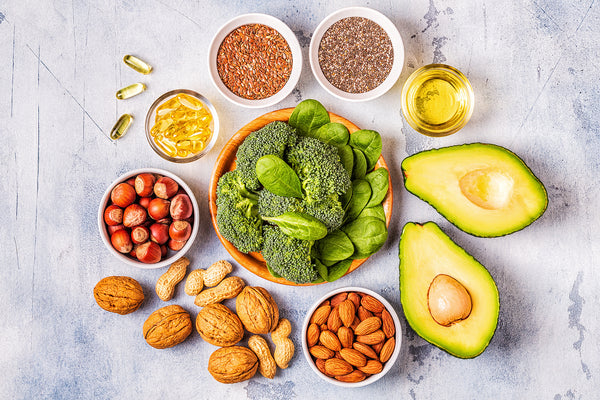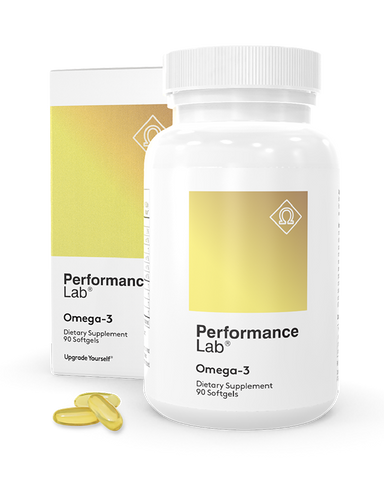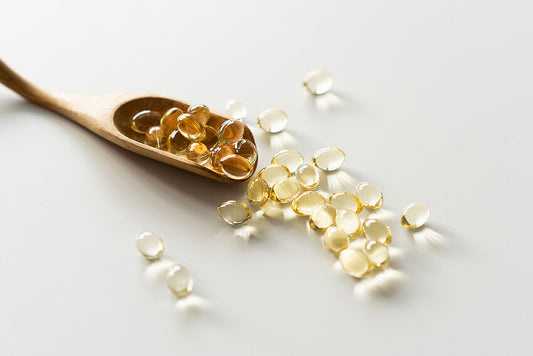You hear about omega-3s all the time in the health space.Take them daily to keep your skin radiating, keep your hair shiny and your nails healthy.
Take them to reduce your levels of inflammation and boost athletic performance, or to keep your joints healthy and avoid arthritis.They’re all over—and it’s no wonder why. Omega-3s are a good runner-up for the #1 spot for the superman of supplements.And with that said, if you haven’t already checked out our article on plant-based omega-3s or fish oils, definitely do that. Why? Because you’ve probably always been told that fish oils are your best bet for getting omega-3s, but we think differently.We’re partial to plant-based ones derived from algae. Here’s a quick recap of what you need to know about omega-3 supplements.
What Are Omega-3s?

Omega-3s are a polyunsaturated fatty acid essential to human health. They cannot be synthesized in the body and are therefore deemed essential; they must be obtained through diet or supplementation. There are three types of omega-3 fatty acids we hear about, but for this article, we’re only going to focus on the two most important: EPA and DHA.
EPA (eicosapentaenoic acid)
EPA and DHA are often lumped together when talked about, but they actually have substantially different roles. EPA function more on the side of cardiovascular health and inflammation, as opposed to brain health.
Eicosanoids, a derivative of another polyunsaturated fat called arachidonic acid (AA), are the primary mediators of cellular inflammation and are where EPA comes into play. EPA helps to inhibit enzymes that produce AA, which essentially shuts down the supply chain for the production of inflammatory compounds prostaglandins, thromboxanes, and leukotrienes 1.And it has been shown that an increased ratio of AA:EPA is a breeding ground for the development of diseases like coronary artery disease, heart attack, stroke, and vascular disease 1.So, if you have any inflammation going on, EPA may be your saving grace to help you deal with it.
DHA (docosahexaenoic acid)
If you want to keep your memory sharp and your brain function on point, you need to be taking DHA.DHA is an integral part of all cell membranes and is richly concentrated in the brain and retina 2.
As such, it’s key to proper brain development and function and is preferentially taken up by the brain over other fatty acids.
It also helps to prevent various chronic diseases and protects against cognitive decline and the development of Alzheimer’s 3.
Where Do They Come From?
Fish oils are the primary source of omega-3s you hear about—but it’s not the only one out there. You may not know this, but fish don’t produce EPA and DHA; it’s accumulated in their tissues because of their diet and then extracted to create fish oil capsules.So, if they consume a diet rich in EPA and DHA, what are they eating you may ask?Algae.Which brings us to our point about plant-based omega-3s. Omega-3 supplements derived from algae are one of the cleanest, purest forms of EPA and DHA you can get. Scrap all the heavy metals, pesticides, and other contaminants you find in traditional fish oil supplements, and opt for one that contains no harsh residues, is highly absorbable, and eco-friendly and sustainable.
Performance Lab Omega 3

What’s This About Omega-3 and Weight Loss?
It’s probably not the first thing that comes to your mind when you’re trying to lose weight, but it definitely should be something to consider.And while you’re not likely to drop 15 pounds in the snap of a finger just by taking them, omega-3s may have a more indirect effect.
May Help to Boost Metabolism
The evidence for this isn’t concrete, but some studies show promise for omega-3s and metabolic rate.One specific study found that daily intake of 6g of omega-3 fats for 12 weeks helped to reduce body fat mass and stimulate lipid peroxidation in healthy adults 4.
Another study found that 12 weeks of 3g daily supplementation boosted resting metabolic rate by 14%, energy expenditure during exercise by 10%, and fat oxidation during rest by 19% 5.
May Reduce Waist-to-Hip Ratio
The weight loss effects of omega-3 fats aren’t yet 100% conclusive.
Still, there is a favorable amount of evidence to suggest they could be beneficial for increasing adipocyte apoptosis, increasing plasma levels of adiponectin, and altering fat oxidation and energy expenditure 6. One study also found that individuals supplementing with omega-3s saw a decrease in W:H ratio, which may be more prominent when combined with lifestyle modifications 6.
How Much Do I Need To Take?
Based on the research available, upwards of 2g per day seems to provide the most beneficial effects, but on average, 3g (3,000mg) daily appears to be helpful with no adverse effects 4, 5, 7.
Up to 6g may be tolerable for some individuals, but speak to your health practitioner to ensure it’s safe for you. Keep in mind that no amount of omega-3 supplementation is going to melt fat away on its own.It’s frankly not that simple, and if it were, it would be a dream come true for a lot of us.However, when combined with a healthy and balanced diet, along with a good exercise program, omega-3 fatty acids may help to boost weight and fat loss efforts.
Learn more about Performance Lab Omega 3 here
References
- JR Nelson, S Raskin. The eicosapentaenoic acid:arachidonic acid ratio and its clinical utility in cardiovascular disease. Postgrad Med. 2019 May; 131(4): 268-277.
- D Swanson, R Block, SA Mousa. Omega-3 fatty acids EPA and DHA: health benefits throughout life. Adv Nutr. 2012; 3(1): 1-7.
- LA Horrocks, YK Yeo. Health benefits of docosahexaenoic acid (DHA). Pharmacol Res. 1999 Sep; 40(3): 211-25.
- C Couet, J Delarue, P Ritz, JM Antoine, F Lamisse. Effect of dietary fish oil on body fat mass and basal fat oxidation in healthy adults. Int J Obes Relat Metab Disord. 1997 Aug; 21(8): 637-43.
- SL Logan, LL Spriet. Omega-3 Fatty Acid Supplementation for 12 Weeks Increases Resting and Exercise Metabolic Rate in Healthy Community-Dwelling Older Females. PLoS One. 2015; 10(12): e0144828.
- S Du, J Jin, W Fang, Q Su. Does Fish Oil Have an Anti-Obesity Effect in Overweight/Obese Adults? A Meta-Analysis of Randomized Controlled Trials. PLoS One. 2015;1 0(11): e0142652.
- M Kabir, G Skurnik, N Naour, V Pechtner, E Meugnier, et. al. Treatment for 2 mo with n 3 polyunsaturated fatty acids reduces adiposity and some atherogenic factors but does not improve insulin sensitivity in women with type 2 diabetes: a randomized controlled study. Am J Clin Nutr. 2007 Dec; 86(6): 1670-9.















